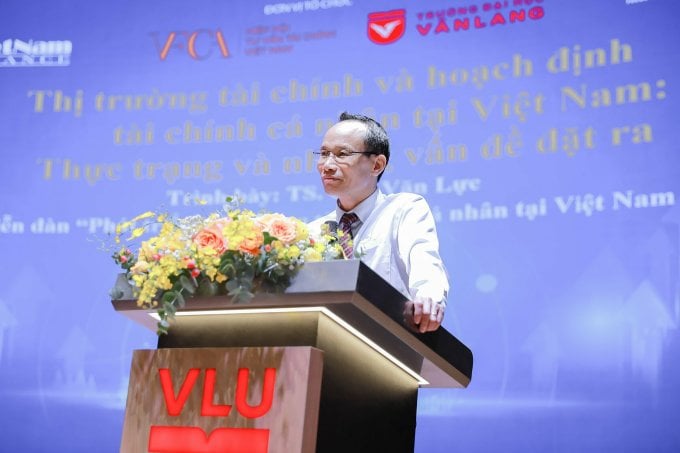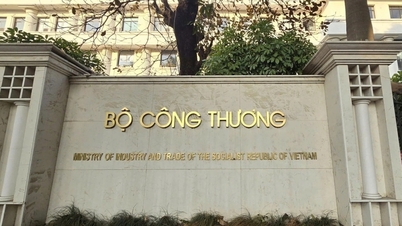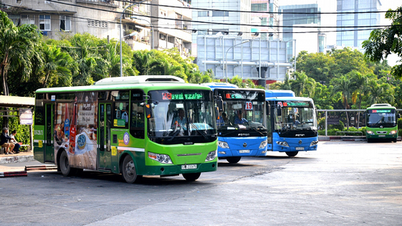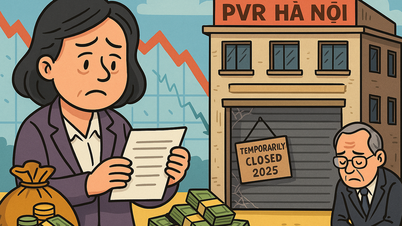The potential of personal finance is huge but not many people pay proper attention to it, which creates opportunities for black credit and fraud to appear, according to Dr. Can Van Luc.
The above content was shared by Dr. Can Van Luc at the forum on Developing the Personal Financial Market in Vietnam on the morning of August 4. According to Mr. Luc, this also creates conditions for black credit, fraud, instability from fintech or scandals about bonds and insurance that have appeared frequently in recent times.
Personal finance is the management of each person's money, including a synthesis of activities such as budgeting, spending money, saving and investing, taking into account financial risks and future events. When planning personal finance, each person will consider their suitability with banking products (savings deposits, credit cards and loans), investment channels (stocks, real estate, gold ...), insurance and participation in retirement plans, social security, tax obligations.
"People do not know that spending money and investing is a waste, so how can Vietnam develop?" Mr. Luc said.

Dr. Can Van Luc speaks at the forum on the morning of August 4. Photo: FIDT
Ms. Nguyen Thi Hien - Deputy Director of the Banking Strategy Institute (State Bank), also said that the level of financial knowledge of Vietnamese people is still low compared to many countries in the region. In addition, a 2019 survey by this unit showed that low-income people often have less financial knowledge than middle- and high-income groups.
Mr. Le Minh Nghia - Chairman of the Vietnam Financial Consulting Association (VFCA) added that people have easy access to many guidance documents but most of them are "floating", not ensuring authenticity for learning. This can be explained by the fact that most people have income from active income. VFCA conducted a preliminary survey in Hanoi and obtained the result that 80% of the capital's people do not know what personal finance is.
In addition, over the past time, people's trust in personal financial channels has still been damaged and has not recovered after many scandals about hot credit, individual bonds, investment insurance, and uncontrolled fintech. Mr. Nghia said that in the three pillars of a country's finance, Vietnam only focuses on public finance and corporate finance, and has no officialeducation policy on personal finance.
Meanwhile, according to Dr. Luc, the scale of Vietnam's personal financial market is very large. Although there are no specific figures, he said it can be measured by the total scale of bank deposits, securities and insurance channels.
Statistics from the BIDV Training and Research Institute show that about 50% of bank deposits come from individual customers. In addition, the stock market has recorded 7.3 million individual investors. In addition, insurance revenue is equal to 2.2% of GDP with tens of millions of participants. From the above estimates, Mr. Luc believes that about half of the population is participating in the personal financial market.
In terms of growth rate, in the period 2011-2022, total assets in the banking channel increased by 12% per year, stock market capitalization grew by about 23% per year, insurance channel increased by about 20% per year in terms of fee revenue, but the bond market grew more slowly than other asset channels. In total, the overall growth rate of the personal finance market reached 14% per year, higher than corporate finance. This figure also increased twice as fast as the growth rate of the economy, showing that the market size is getting larger.
The potential for personal finance market development is also large. Mr. Nguyen Tu Anh - Deputy Director of the Monetary Policy Department of the State Bank, said that the demand for personal finance will increase as the middle class in Vietnam increases rapidly. Previously, the McKinsey Global Institute ranked Vietnam in seventh place in the group of countries with the fastest growing middle class in the world. This unit predicted that the group of people who can spend over 15 USD a day in Vietnam will increase by 36 million people by 2030.
The scale, growth rate and development potential are all high. Therefore, the lack of interest and initiative of people to learn about the market becomes a big obstacle.
Experts all agree that the core to balancing the personal financial market is to promote potential and limit risks. The best way is to improve people's knowledge about financial forms. In particular, Dr. Can Van Luc proposed to include personal finance in the education program from high school level. Universities are also studying the establishment of a personal financial planning training program to create a generation of professional and formal consultants.
Personal financial management has many problems, but Mr. Luc said that everyone should learn about how to increase income, save, invest and spend. These are the most basic areas, then you can learn more about taxes, insurance, inheritance...
This expert suggests that before buying a car, buying a house or any financial behavior, you should get into the habit of building a management roadmap before implementing it. Start by setting financial goals, then evaluate the current situation, prepare options and plans, analyze and choose the appropriate plan, implement the plan and monitor.
Siddhartha
Source link




![[Photo] National Assembly Chairman Tran Thanh Man meets with Thai Prime Minister Paetongtarn Shinawatra](https://vphoto.vietnam.vn/thumb/1200x675/vietnam/resource/IMAGE/2025/5/15/e71160b1572a457395f2816d84a18b45)
![[Photo] Prime Ministers of Vietnam and Thailand visit the Exhibition of traditional handicraft products](https://vphoto.vietnam.vn/thumb/1200x675/vietnam/resource/IMAGE/2025/5/15/6cfcd1c23b3e4a238b7fcf93c91a65dd)































































































Comment (0)